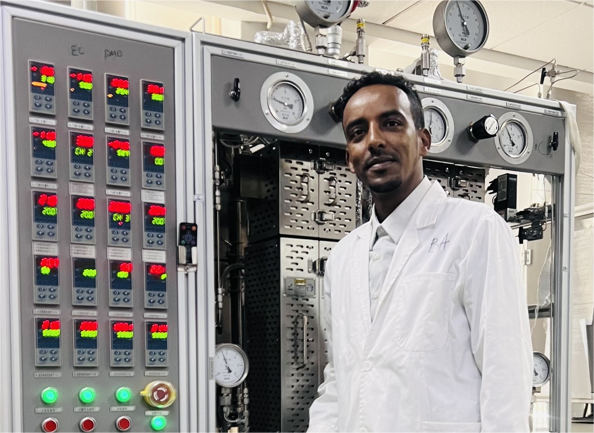An Ethiopian Scholar Immerses in Green Development
By ZONG Shihan

Dr. Busha Assaba Fayisa. (COURTESY PHOTO)
"I would love to stay in China because China has been a global leader in scientific research and innovation," Dr. Busha Assaba Fayisa, an Ethiopian postdoctoral fellow at the School of Chemical Engineering and Technology, Tianjin University, told Science and Technology Daily recently.
Fayisa came to China to pursue a doctoral degree eight years ago. Now, he is committed to innovative research on the catalytic utilization of CO₂ via its derivatives. During his stay, he has witnessed progress in China's green development and is keen to promote cooperation between China and Ethiopia with his knowledge.
Fortunate to study in China
"China's relationship with Ethiopia has been strong for over 50 years, and it has been further strengthened by the Belt and Road Initiative, which has led to increased collaboration in various sectors, including infrastructure, economy, and cultural and social development. I also benefit greatly from the close bilateral relations," said Fayisa.
With a five-year chemistry study background and four years of teaching experience in Ethiopia’s university, Fayisa joined the C1 Chemistry and Technology Group at China's Tianjin University to pursue his doctoral degree.
"I was fortunate enough to come to China to pursue my Ph.D. in green chemistry," he said, adding that "I have been working on the design and development of copper-based catalysts for the synthesis of methanol and ethylene glycol from the hydrogenation of CO₂-derived ethylene carbonate." Joining the C1 chemistry and technology group, under supervision of Prof. Ma Xinbin and Wang Yue, allowed Fayisa to collaborate with a renowned and hard-working team that has shown excellent progress in the field and gain valuable insights into global research trends and practices.
The Chinese government's policy of supporting international students has provided Fayisa with valuable academic opportunities. Under the MOFCOM Scholarship, set up by China's Ministry of Commerce, he has successfully completed his PhD research and can focus more on green chemistry research.
Impressive Green development
China has been investing in various green technologies and initiatives to reduce CO₂ emissions and promote sustainable development. Since his arrival in China, Fayisa has seen great progress in green development happen in several ways.
The first is that national policy plays a huge role in driving changes. "China has proposed to achieve its 'dual carbon' goal of peaking CO₂ emissions by 2030 and achieving carbon neutrality by 2060 through technology," said Fayisa, adding that remarkable progress has been achieved in research and development and industrialization in the past several years.
In recent years, large-scale industrial projects have been implemented in China to demonstrate the potential of CO₂ utilization. As an example, Fayisa mentioned his research group’s remarkable achievements in research and industrial application on CO2 utilization. China has made progress in CCUS technology, which is a process of capturing CO₂ discharged from fossil power generation and industrial processes for underground storage or reuse. Busha mentioned the Qilu-Shengli Oilfield CCUS project, China's first megaton-scale carbon capture, utilization and storage project, which is expected to reduce CO₂ emissions by one million tons per year, equivalent to planting nearly nine million trees.
"Chinese researchers are very active in CO₂ utilization areas," he said, adding that methanol converted from CO₂ can be used as a fuel or as a raw material for the chemical industry, helping to solve the problem of global warming.
"I will stay in China while contributing more to green development in the future. I would also like to seek more forms of collaboration between institutions or universities of China and Ethiopia," said Fayisa.







